Artificial Intelligence (AI) is evolving and becoming a part of our lives faster than ever before.
In 2024, companies will learn to use AI to its full potential, individuals will use it to be more productive, and governments will try to regulate it, but AI will still be everywhere we look.
In this article, we outline different relevant data on AI to simplify complexities and help you navigate the challenges ahead. From optimizing websites with AI-powered algorithms to leveraging machine learning for data analysis, this will be your guide through the transformative power of AI.
Table of Contents
Key Takeaways
- 37% of businesses and organizations use AI (94% of business leaders, emphasizing the need for its strategic integration)
- The adoption of natural language text understanding technologies, at a rate of 33%, indicates the growing significance of AI in processing and interpreting human language for various applications.
- 44% of businesses reduce costs when using AI
- people are increasingly more concerned than excited
- Americans fear privacy issue but are excited about AI in other areas
Understanding the AI Landscape
As AI continues to develop, we can expect to see it even more widely used in our lives.
Google Trends data shows interest in AI is growing rapidly. This is likely due to the increasing number of AI-powered products and services that are becoming available, as well as the growing awareness of the potential benefits of AI.
Worldwide Google Trends Analysis
- Google Trends Comparison - OpenAI, Bing, and Bard
The Google Trends comparison below shows that interest in OpenAI and Bard has been growing rapidly in recent months, while interest in Bing has remained relatively flat. This suggests that people are becoming more interested in large language models and their potential applications.
Significant differences if we compared chatGPT with Bing Chat and Bard:
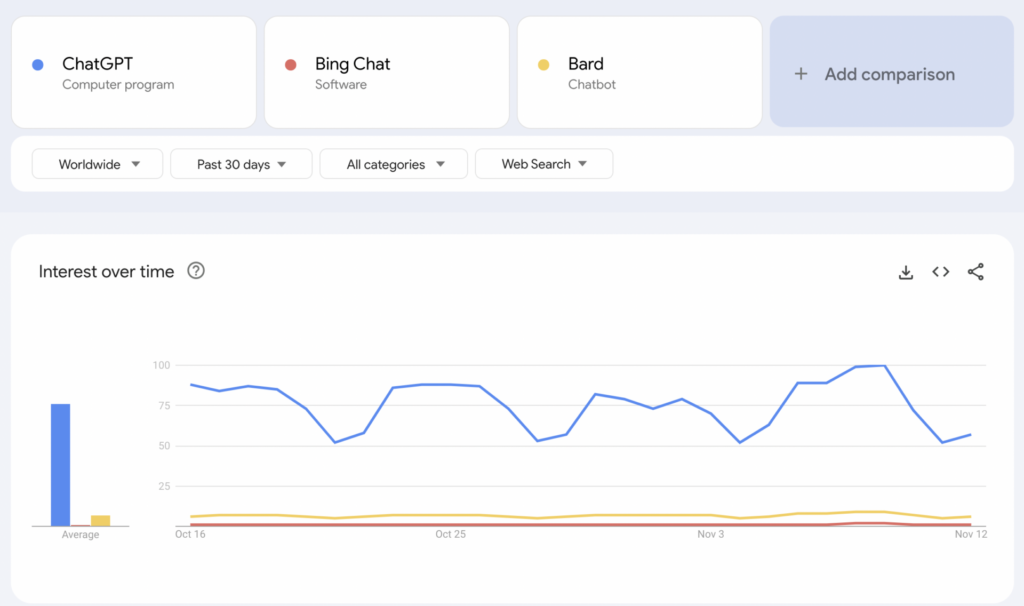
- Google Trends Comparison - AI Chatbots, Video Editing AI, and Writing AI
The Google Trends comparison below shows that interest in all three of these technologies has been growing in recent months, but that interest in writing AI has been growing fastest. People are becoming more interested in using AI to generate text.
Writing AI
AI Website Builder
Public Awareness of AI in Everyday Activities in the US
In the new Pew Research Center survey on public awareness of AI in everyday activities, many Americans are aware of common ways they may encounter AI in daily life. These include customer service chatbots and product recommendations. But, only three-in-ten U.S. adults are able to identify all six uses of AI asked about in the survey. And this underscores the developing nature of public understanding.
Moreover, the public remains cautious about the impact AI is having on American life, with more people concerned than excited about its increasing use in daily life.
Overall, the survey suggests that while public awareness of AI is growing, there is still a need for more education and outreach about AI to help the public understand its potential benefits and risks.
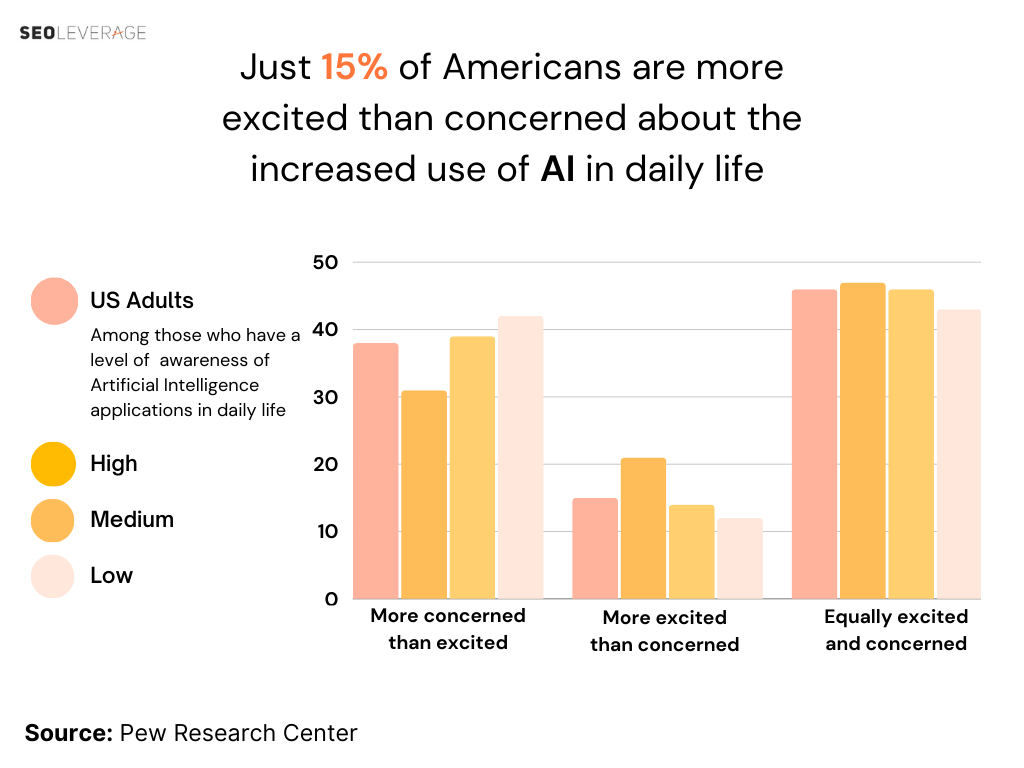
AI's Impact on Businesses and Why You Need to Adapt
Businesses of all sizes and industries are using AI to boost their bottom line. If you are not prepared for the AI revolution, you are at risk of being left behind.
Forbes Insights: AI for Businesses
Forbes highlighted businesses are using AI in 2023 in different ways, including customer service, marketing, sales, product development, and operations.
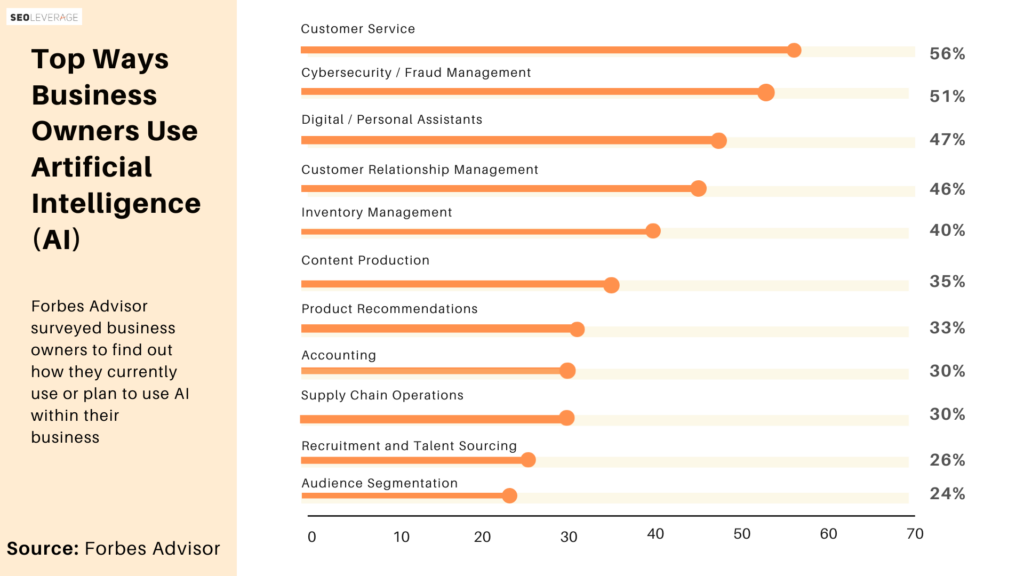
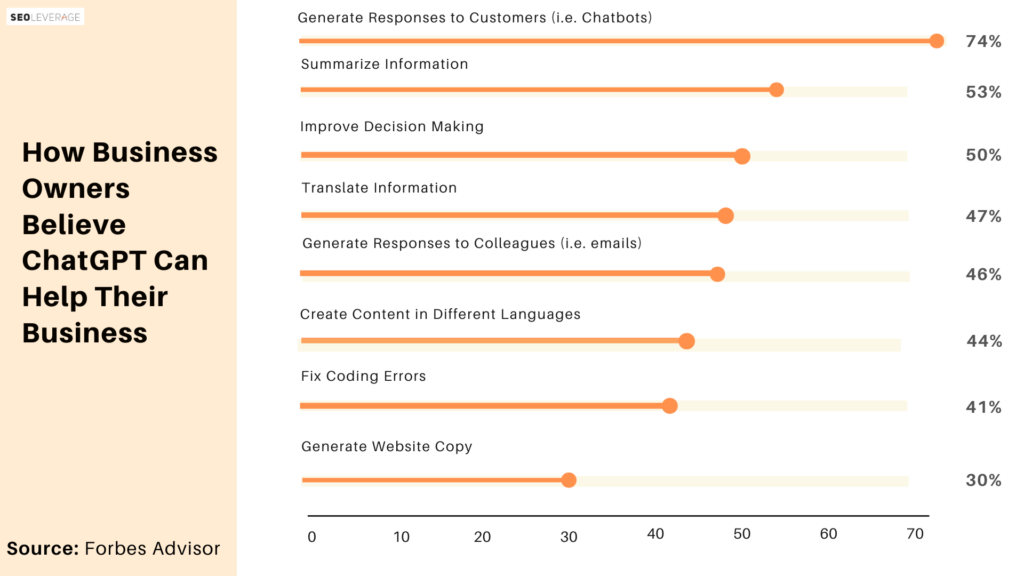
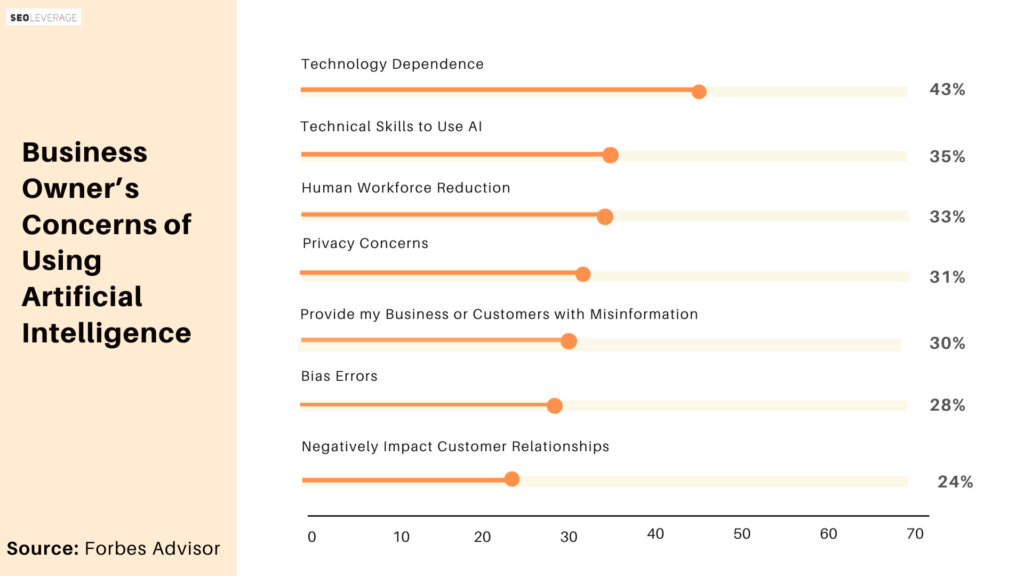
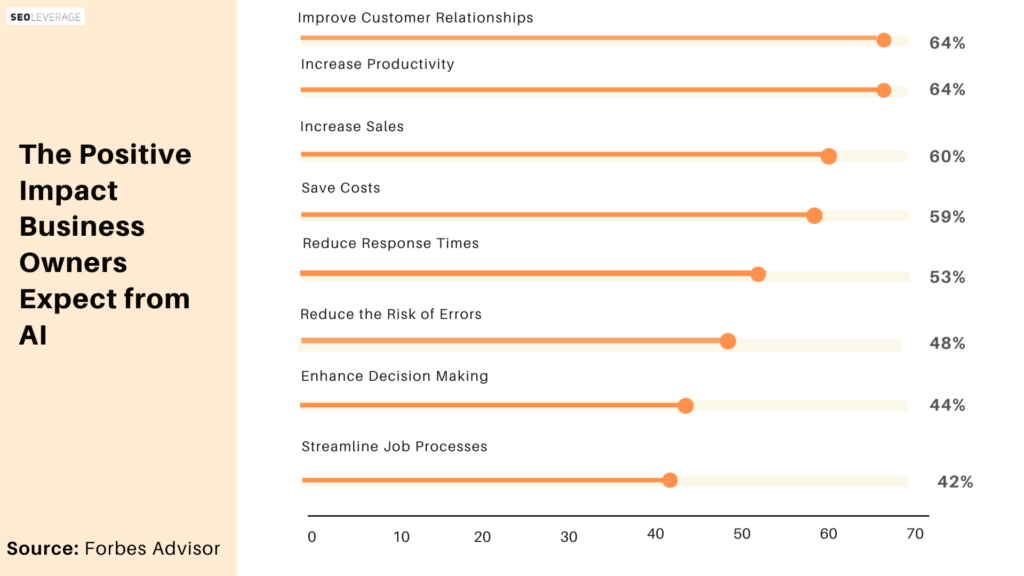
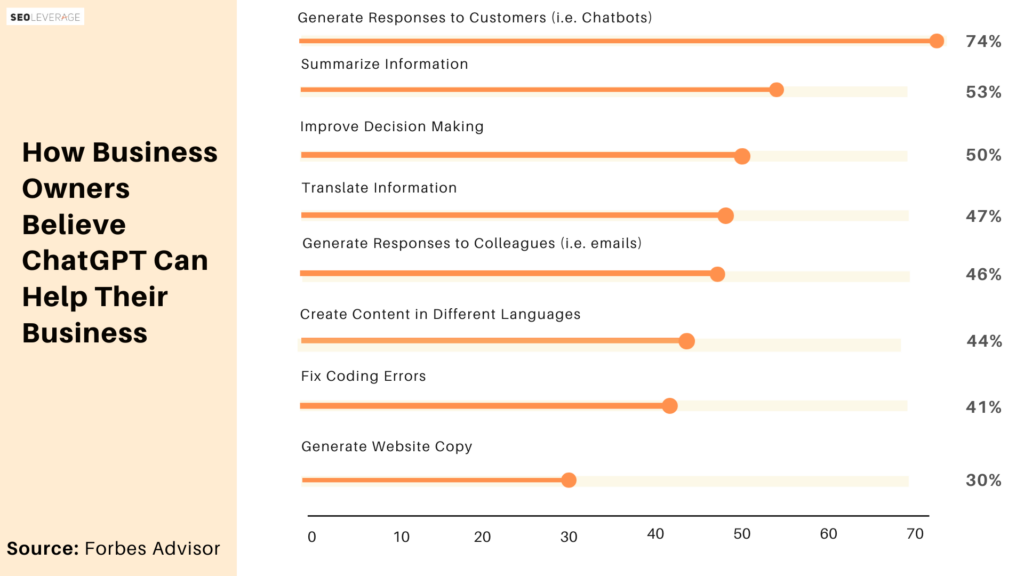
Annual Granted Patents Related to AI by Industry World
AI is transforming businesses and industries around the world. Businesses that are able to adopt and use AI effectively will succeed in the future.
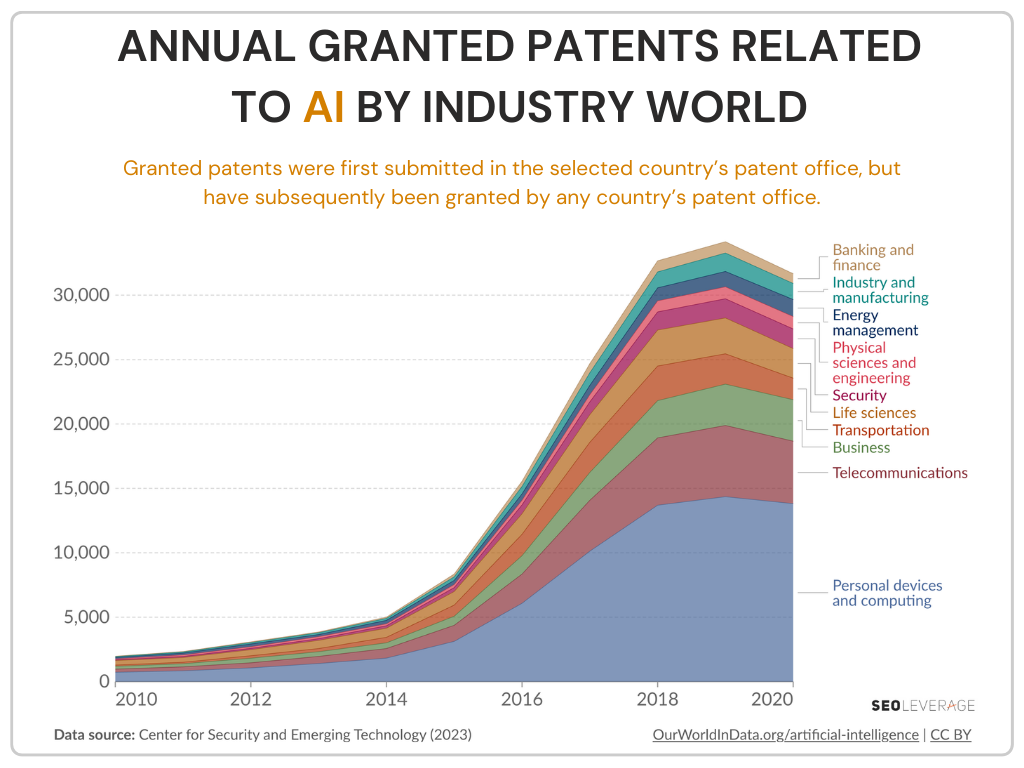
How People Are Reacting to AI
The growing public concern about the role of AI in daily life is likely to have a significant impact on customers/consumers. Businesses and governments must address these concerns to maintain public trust and confidence.
Businesses that are able to address public concerns about AI and use AI responsibly and ethically will be well-positioned to succeed in the future.
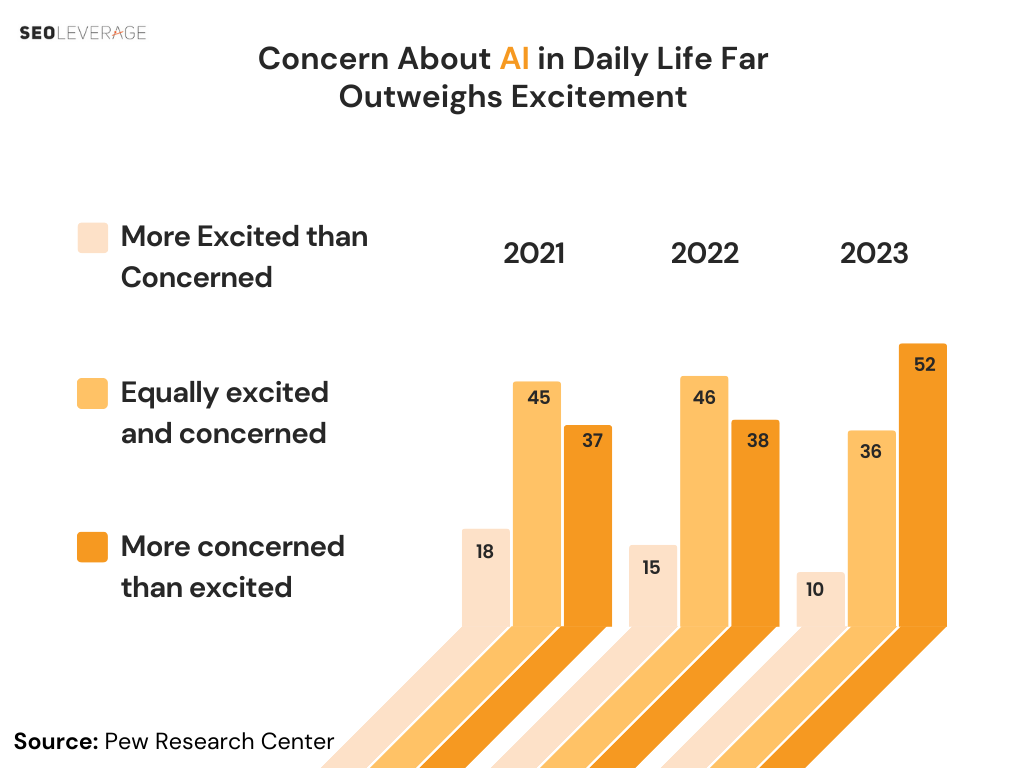
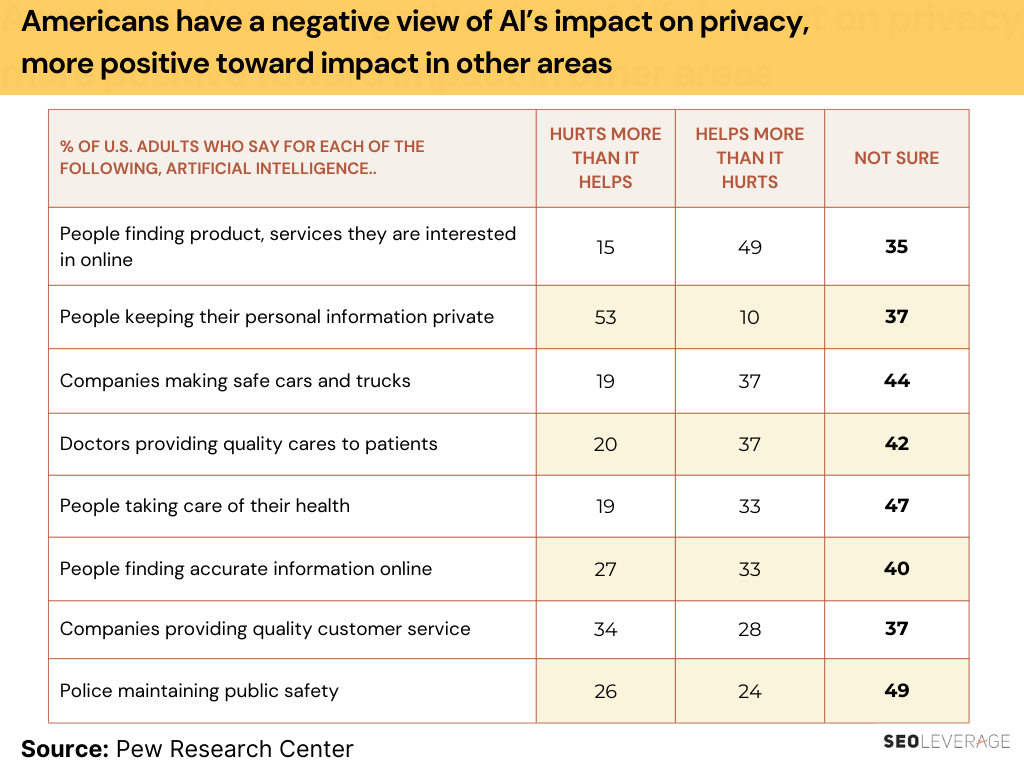
Other AI Statistics in Business
Top AI Statistics in Business According to businessolution.org
- AI is used by 37% of companies and organizations.
- Companies that have already adopted AI will be ten times more effective than those that have not, and they will hold twice as much of the market share by the year 2025.
- 91% of ten of the most successful companies are making investments in AI
- 53% of businesses implement AI by purchasing ready-made commercial AI software
- 28% of businesses made their own AI software or had their own employees make changes to commercial software
- By 2025, employment losses due to AI will total 85 million, while job gains will total 97 million.
- Four out of ten customers think businesses will be more cautious with customer data when using AI.
- 44% of businesses that use AI say that it has led to lower costs in areas where it is used.
- The likelihood of having an AI strategy is highest among the biggest businesses, yet only half do.
- Enterprises will be forced to employ AI, according to 63% of businesses.
- 54% of CEOs claim that implementing AI technology in their companies has already enhanced productivity.
- Corporate executives who have an innovation strategy use AI to find opportunities in data that might otherwise go unnoticed, according to 61% of them.
Why do businesses need to adapt to AI?
With all these data on how AI has influenced businesses today, here are a few key reasons why you must adapt to AI:
- To stay competitive. AI is already being used by many businesses to improve their efficiency and productivity. If you don't adopt AI, you will quickly fall behind your competitors.
- To improve the customer experience. AI can be used efficiently to increase customer satisfaction and loyalty.
- To create new opportunities. AI is opening up new opportunities for businesses in all industries. For example, you can use AI-powered chatbots to sell your products and services and AI-powered analytics to develop new products and services.
Expert Insights: How to Survive by Preparing Your Business for 2024
As we approach 2024, business owners must be keenly aware of the evolving AI landscape. The "AI Index Report 2023" (Stanford University) offers valuable insights into this evolution, emphasizing trends crucial for businesses:
- Strategic AI Integration: The importance of AI in organizational success is recognized by 94% of business leaders, emphasizing the need for its strategic integration.
- Navigating AI Project Challenges: Addressing challenges such as proving AI's business value and securing executive commitment is crucial, as highlighted by 37% and 34% of leaders, respectively.
- Adoption of Robotic Process Automation (RPA): RPA has the highest rate of embedding within industries, with a 39% adoption rate, showcasing its importance in automating and streamlining processes.
- Increased Use of Computer Vision: With a 34% adoption rate, computer vision is becoming a key technology in various industries, used for enhancing operations and customer experiences.
- Focus on Natural Language Understanding: The adoption of natural language text understanding technologies, at a rate of 33%, indicates the growing significance of AI in processing and interpreting human language for various applications.
These trends represent the significant areas where AI is making an impact and where businesses need to focus their efforts to stay competitive and innovative.
To thrive in the AI era, you need to start preparing now. This means understanding the different ways that AI can be used to improve business operations, identifying areas where AI can be implemented, and investing in the necessary training and infrastructure.
SEO expert Gert Mellak shares insights on how you can continue to get ahead of the competition in a world where AI is dominating the digital era:
Develop an AI Strategy
First, you need to understand your business goals and how AI can assist you in achieving them. After that, you can identify specific use cases for AI in your business.
Here is a step-by-step guide to developing an AI strategy:
1) Define your business goals
What are your top priorities for the next year, two years, and five years? How can AI help you achieve these goals?
2) Identify AI use cases
What tasks can be automated with AI? What decisions can be improved with AI? What products can be created with AI?
3) Assess your current capabilities
What are your current capabilities in terms of AI? Do you have the necessary expertise, data, and infrastructure to support AI initiatives? If not, what steps do you need to take to close the gap?
4) Develop a roadmap
Once you have identified your AI use cases and assessed your current capabilities, you can start to develop a roadmap for implementing AI in your business. This roadmap should include a timeline, budget, and resource allocation plan.
5) Communicate and execute your AI strategy
Once you have developed an AI strategy, communicate it to your employees, customers, and other stakeholders. This ensures everyone is on the same page, working towards the same goals.
Here are some additional tips for developing an AI strategy:
- Start small. Don't try to implement AI across your entire business overnight. Start with a few key use cases where AI can make a big impact.
- Get buy-in from leadership. It is important to have the support of senior leadership to successfully implement AI. Explain to them the potential benefits of AI and how it will help the company achieve its goals.
- Invest in the right talent. AI is a complex technology, and it requires the right talent to implement and manage it. Make sure to invest in training for your employees or hire external consultants with AI expertise.
- Focus on data. Data power AI, so it is important to have a good data foundation in place. Make sure to collect the right data and store it in a way that is accessible to your AI applications.
- Monitor and evaluate your results. AI is a constantly evolving field; thus, monitor and evaluate your results on a regular basis. Identify areas where you can improve your AI initiatives.
Leverage AI for Competitive Advantage
Here are ways you can leverage AI for competitive advantage:
Automate tasks
AI can be used to automate many repetitive and time-consuming tasks. You can use it for data entry, customer service, and social media management. This allows you to focus on more strategic and creative work.
Improve decision-making
Make better decisions with AI - analyze large amounts of data. Then, identify patterns that would be difficult or impossible for humans to spot.
For example, you can use AI to identify the most profitable customer segments, predict future demand, and optimize product pricing.
Create new products and services
Use AI to develop new offerings that meet the changing needs of customers.
For example, you can use AI to develop personalized product recommendations, create chatbots that can provide customer support, and develop new diagnostic tools.
To leverage AI for competitive advantage, start by identifying the areas where AI can have the biggest impact. Once these areas have been identified, you must invest in the necessary data, infrastructure, and expertise to implement AI solutions.
Build Trust and Transparency in AI Adoption
Ensure AI is used to deliver ethical, responsible, and effective marketing campaigns. Here are some specific steps you can take:
Adopting industry best practices
There are a number of industry organizations that have developed best practices for the responsible development and deployment of AI in digital marketing. You must adopt these best practices to demonstrate your commitment to responsible AI use.
Publishing AI ethics principles
You can publish AI ethics principles to articulate your values and commitments with respect to the development and use of AI in digital marketing. This builds trust with consumers and demonstrates that you are taking AI ethics seriously.
Engaging with consumers
You should engage with consumers about your AI initiatives. This could mean participating in industry events or working with stakeholders to address concerns about AI.
Prepare for Future AI Developments
AI is rapidly transforming the world around us, and it is important to be prepared for the changes that it will bring.
Here are some tips:
Learn about AI
If you understand how AI works, including its benefits and risks, you will be better equipped to make informed decisions about how to interact with it.
Identify opportunities for AI use
Once you understand AI, you can start to identify opportunities to use AI in your business or personal life. If you can identify opportunities for AI use, you can position yourself to benefit from this powerful technology.
Invest in the right skills and infrastructure
To implement AI solutions, you must invest in the right skills and infrastructure. This may require training your employees in AI or hiring external consultants with AI expertise. You may also need to invest in hardware and software to support your AI initiatives.
Moreover, develop your soft skills. AI is unlikely to replace the need for human skills such as creativity, critical thinking, and emotional intelligence.
Be prepared to adapt
Gert Mellak has been working in the SEO industry since 1999, and he is one of the leading experts in the field. He has helped hundreds of clients around the world improve their search branding and SEO performance.
Mellak is passionate about helping brands succeed in the digital age, and he is committed to helping you stay competitive as AI becomes more commonplace in SEO and the business realm.
Gert Mellak strongly believes that AI is increasingly becoming integrated into search engines, and it is important for companies to understand the effect it can have on their brand reputation.
One of the biggest problems with AI search engines is that they can be easily confused by conflicting information about a brand. This can lead to poor search results, low rankings, or even incorrect information about a brand.
Mellak's solution to this problem is Active Search Branding (ASB). This process proactively monitors your brand's online presence on search engines and initiates actions to optimize your branded search results.
Mellak also believes that AI provides a lot of opportunities for smaller brands to compete with large companies. With the right AI content generation tools and professional human editors, you can now produce large amounts of high-quality content that can help you rank higher on search engines.

